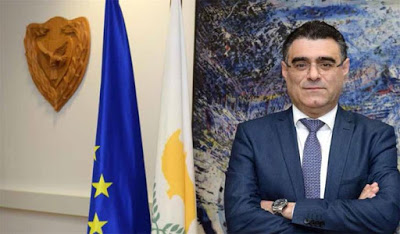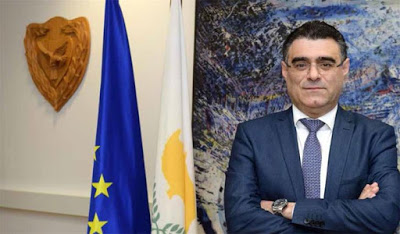The Minister of Agriculture, Rural Development and Environment, Nikos Kougialis, expressed his commitment that free Famagusta is a priority for the Government through an interview with the newspaper "Phileleftheros".
The Minister of Agriculture also referred to the water project "Kokkinokremmos" in the province of Famagusta, stating that the project ensures the uninterrupted supply of water in the province for the next 20 years with tanks with a capacity of 40.000 sq.m. and with a 48-hour water supply security.
It also reveals the Government's plans for the projects that are being implemented, those that are in the pipeline, but also in the aim of the drought-stricken Cyprus to ensure sufficient quantities of water for all uses, both for water supply and irrigation, through the restriction of the dependence of the water supply on rainfall.
He also referred to the fact that the Ministry of Agriculture promotes the taking of effective and efficient measures aimed at the final solution of daily and long-standing problems related to water. One such issue concerns infrastructure, where after dams and desalination that cover most of Cyprus, projects are required so that areas such as Nicosia and Famagusta are not at risk of running out of drinking water.
You recently attended an event for the implementation of the Kokkinokremmos water project in the free area of Famagusta. You have described this project as a landmark for the area. What are the reasons?
With the assumption of the government of Nikos Anastasiadis, I said that we will bring back the problems that we had hidden under the carpet for years to solve them. One of these projects concerns the security of water supply of the free area of Famagusta.
Today it is time to solve it. We started the project in order to ensure the water supply of the area for the next 20 years. This is done with the construction of new reservoirs with a capacity of 40.000 sq.m., which will provide 48-hour water supply security in the areas of free Famagusta during peak days.
At the same time, we will proceed with the construction of a new 26 km pipeline that will transport water from the desalination of Dhekelia to the Kokkinokremmos reservoirs in the Famagusta area, we will upgrade the Dhekelia Pumping Station and gradually replace the old pipeline to A.
This project will support the development of the tourism industry in the area where the beds are increasing after the incentives given by the Government to welcome more tourists.
Therefore, larger quantities of water are needed to support the wider development of the area, both residential through the local plan and business throughout the Province.
At the same time, this is an environmental project as we will save significantly in terms of energy consumption of the water distribution system (€ 700.000 per year) with consequent reduction of pollutants.
Also important is the value of the project that results from the possibility of supplying the city of Famagusta in case of solution of the Cyprus problem. For these reasons I have said that the project is a milestone, as it is one of the most important infrastructure projects in the region.
When will the project be delivered?
Regarding the construction of the project, let me mention that it will be implemented gradually in phases. Until January 2018, uninterrupted water supply and at the same time 24 hour water security will be ensured, while until the end of 2020, with the completion of the project, water security will be ensured for 48 hours, compared to the only 4 hours provided today.
At this point I should note that in addition to the water supply of the areas of Ayia Napa, Paralimni, Deryneia and Sotira, due to the interconnection of the pipeline with the existing pipeline Choirokoitia-Famagusta, the other communities of Kokkinohorion, ie Avgoroforou, Ormologia, also benefit. Liopetriou.
Last year, tourist municipalities and communities in the province of Famagusta faced water supply problems. If they arise this summer with increased demand, how will you deal with them?
Last year we had an unexpected event and we were called to face it. It is a fact that even today the daily quantities received by the areas with increased demand in July and August are lower than their daily needs. The works of the water tanks will be completed by January 2018.
However, we have upgraded the pumping station in Avgorou in order to send larger quantities due to the existing pipeline. If problems arise there are action plans and we will address them to the greatest extent. This work had to be done yesterday.
The current Government proves that the free province of Famagusta is not secondary, but its development and prosperity are its priority. With the completion of the project, uninterrupted water supply and water safety will be ensured and new perspectives are created for the development of the area.
Similar problems with the province of Famagusta exist with the area of Nicosia where again there is dependence on the Southern Pipeline and in case of damage the capital will be exposed. Are you planning work to solve the problem?
Another major infrastructure project, which is underway, concerns the construction of the water transfer pipeline from the Vasilikos desalination plant in Nicosia. The project is vital and will cover the water supply needs of the greater Nicosia area for the next 30 years.
The construction of the project solves the long-standing problems of water supply of the entire province, which is currently supplied through an obsolete pipeline and enhances the reliability of the water distribution network, with alternative supply.
The project, with a total cost of € 54 million, includes the construction of 167 km of pipelines, pumping stations and other supporting infrastructure projects capable of transporting 60.000 m3 of desalinated water per day to meet the growing needs of the city of Nicosia and the 28 communities in the western province of Nicosia.
The 28 communities, which are proposed to be supplied with water by the project, are the following: Agios Ioannis Malountas, Agioi Trimithias, Agrokipia, Akaki, Anagia, Analyontas, Arediou, Astromeritis, Denia, Episkopeio, Ergates, Kampia, Kapedes, Kato Dede Kokkinotrimithia, Kotsiatis, Malounda, Mammari, Marki, Meniko, Mitsero, Pano Deftera, Paliometocho, Pera, Peristerona, Politiko, Psimolofou.
In addition to the 28 communities, it is proposed that the Municipalities of Tseri and Lakatamia be supplied with water by the project. It is noted that a loan of € 40 million was secured from the European Investment Bank to finance the Project.
The project will be completed in two phases. Who are they;
Specifically, the project is divided into two phases:
Phase A: Central Sewerage Pipe Choirokoitia-Nicosia
Phase A of the project includes pipelines for the transfer of water from the new reservoir to Choirokoitia through the Kofinou pumping station to the new reservoir in Stavrovouni and then by gravity to the SYL reservoirs in the mushroom. Phase A includes pipelines with a total length of 71.750 m, three new tanks, two pumping stations as well as all the necessary supporting projects.
Phase B: Communities connecting the Western District of Nicosia
Phase B aims to build the necessary infrastructure for water transport to the communities under study and includes pipelines with a total length of 95.400 m, four pumping stations, two tanks and the necessary support projects. It is noted that the installation of the pipeline, according to the plans, is done in parallel with the Nicosia - Limassol highway, with the result that there are no financial costs or time delays, due to expropriations, since it is already expropriated land.
Recently, there has been a lot of noise about the new pricing policy that will be implemented in the water sector with the promoted increases by the Water Development Department in the water supplied by the Water Supply Councils. Could the new fees have been avoided?
Today there are two problems facing Cyprus in relation to pricing policy. The first concerns the non-uniformity in the water billing policy and the second the absence of the environmental and natural resource fee in the water billing. The goal is to gradually move smoothly to a nationwide pricing.
New charges are the first step in this transition. Regarding the differentiation in pricing, this results from European directives that should have been implemented since 2010. The fee is a prerequisite for the Republic of Cyprus to be able to raise € 250 million from the co-financed Structural Funds for environmental projects.
In some cases the charge increases and in others it decreases. For farmers, for example, the charges remain the same or are reduced.
Note that the new pricing policy is a unanimous proposal of the Water Management Advisory Committee (SEDY), which consists of representatives of agricultural organizations, the Union of Municipalities, the Union of Communities, the Water Supply Councils and the Sewerage Councils.
Social, economic and environmental impacts, as well as geographical and climatic conditions, have been taken into account in the formulation of pricing policy, and have been widely consulted.
Where is the issue with the desalination of Paphos?
Regarding the desalination of Paphos, a final decision has been taken for the dismantling of the old unit and the announcement of a new desalination unit with a capacity of 15.000 sq.m. water per day. As part of the implementation of the Government's policy for the de-dependence of water supply from rainfall, all areas of Nicosia, Limassol, Larnaca and Free Famagusta can be served by the existing desalination plants, which have a total capacity of 220.000 sq.m. water per day.
The only area that is not currently covered by a desalination plant is the area of major Paphos. And because the climatic conditions regarding rainfall are constantly deteriorating while the needs of the province of Paphos for water are constantly increasing, the installation of the desalination plant in Paphos is necessary to achieve the security of water supply of the province.
We have submitted a relevant proposal to the Council of Ministers for launching all the necessary procedures. The new unit is proposed to be built on the site where the temporary desalination plant was built in 2009, with the aim of utilizing all existing infrastructure in this area.
Much has been said about the issue of desalinated water. Do some people claim that desalinated water is used while there are stored quantities in the dams?
On the contrary, the policy we have followed in recent years has been to buy as little water as possible.
In the four years 2013-2016, € 155 million have been spent, compared to € 250 million in the years 2009-2012, ie € 100 million less.
Our policy is proven through the economic data, it is the correct use of water in combination with the weather conditions and the fullness of the dams. When the dams are sufficiently full, then the quantities purchased from the desalination plants are small.
Source: SotiraNews / Phileleftheros

